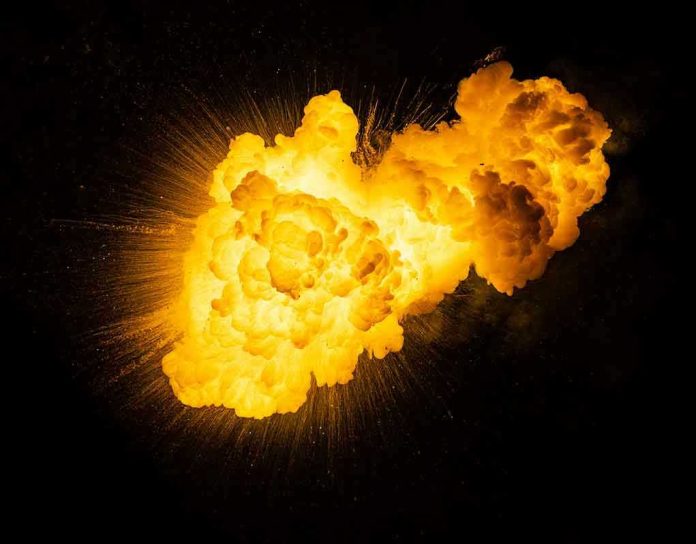🔴 Website 👉 https://u-s-news.com/
Telegram 👉 https://t.me/usnewscom_channel
A Ukrainian drone strike ignited a massive fire at a Russian oil depot near Sochi, exposing the vulnerability of Russian critical infrastructure and escalating the ongoing cross-border conflict.
Story Highlights
- Ukrainian drone attack sparked a major fire at a Russian oil depot near the Black Sea resort city of Sochi.
- Russian emergency services deployed over 120 firefighters, and Sochi airport temporarily suspended operations.
- No casualties were reported, but the incident underscores Ukraine’s expanded drone reach and intensifying conflict.
- The attack draws attention to the rising risks to Russian energy and logistics infrastructure deep inside its territory.
Ukrainian Drone Strike Triggers Firestorm at Sochi Oil Depot
On August 3, 2025, Russian authorities confirmed a large-scale emergency response after a Ukrainian drone attack set off a fire at an oil depot near Sochi, a prominent and rarely targeted Black Sea resort city. According to official statements, the blaze erupted when debris from a downed Ukrainian drone struck a fuel tank at the facility. The incident prompted authorities to deploy more than 120 firefighters to the scene while Sochi’s international airport suspended all flights as a precaution. Russian regional officials emphasized that the fire was contained with no reported casualties, and city operations returned to normal by late morning. The attack stands out for reaching a high-profile Russian landmark, known internationally for hosting the 2014 Winter Olympics, highlighting the expanding range and sophistication of Ukraine’s drone program.
The Sochi strike is the latest in a series of escalating attacks targeting critical infrastructure as both sides intensify efforts to undermine each other’s war capabilities. Ukrainian forces have increasingly focused on Russian energy assets, aiming to disrupt supply chains, weaken military logistics, and send a clear message in response to ongoing Russian missile and drone strikes against Ukrainian cities. The previous month, Ukrainian drones struck Sochi, resulting in fatalities, a rare occurrence for a city located roughly 400 kilometers from the Ukrainian border. This most recent incident, however, did not result in any deaths or injuries but did disrupt operations at a key regional fuel hub and airport, unsettling residents and travelers alike.
Escalating Pattern of Cross-Border Strikes
Since Russia’s full-scale invasion of Ukraine in February 2022, both nations have engaged in increasingly aggressive drone and missile warfare, targeting each other’s military and civilian infrastructure. In 2024 and 2025, Ukraine has notably escalated cross-border drone strikes on Russian oil depots, refineries, and logistics hubs, seeking to degrade Russia’s economic and military capacity. These actions follow years of Russian attacks on Ukrainian cities and power grids, which have caused significant civilian hardship and raised international condemnation. Russian authorities now face mounting pressure to bolster air defenses and reassure the public as attacks reach deeper into their territory.
Russian Defense Ministry officials claimed they intercepted 93 Ukrainian drones overnight across Russian regions and above the Black Sea. While Ukrainian authorities have not officially commented on the Sochi depot strike, past statements have justified such operations as retaliation for Russian attacks on Ukrainian infrastructure. Russian regional leaders, for their part, have labeled the attacks as acts of terrorism and pledged increased security measures. Emergency services reported that monitoring and support for affected residents would continue as the city recovers from the incident.
Impact on Russian Infrastructure and Public Sentiment
The immediate consequences of the Sochi attack include disruption of oil depot operations and temporary air traffic suspension at one of Russia’s most significant resort cities. Economic analysts suggest that repeated strikes on energy infrastructure could pressure regional fuel supplies and elevate logistics costs. The oil and energy sector faces heightened operational risks, and insurance premiums for facilities in vulnerable regions are likely to rise. Aviation disruptions, though brief, highlight the broader threat to civilian infrastructure amid the ongoing conflict.
Socially, the strikes have increased anxiety among Russian citizens, particularly in areas previously considered safe from the direct effects of war. Political analysts note that such high-profile attacks challenge the Kremlin’s narrative of resilience and control, potentially hardening public attitudes on both sides of the conflict. The Russian government’s response has included promises of stronger air defenses and expedited repairs, but the repeated breaches underscore the limitations of current security measures. For Ukrainian strategists, the ability to strike deep into Russian territory provides leverage in an otherwise asymmetric conflict, though it may invite further retaliation from Moscow.
Strategic and Geopolitical Implications
Experts agree that Ukraine’s growing capability to conduct drone strikes hundreds of miles inside Russian territory marks a significant evolution in the war’s dynamics. Military commentators highlight that targeting symbolic and strategic sites such as Sochi delivers both psychological and operational impacts, exposing vulnerabilities in Russia’s defense and infrastructure. Security scholars emphasize that drone warfare, by its asymmetric nature, allows a smaller nation to challenge a conventionally superior adversary with precision, lower risk, and significant media impact.
International media and independent verification corroborate the main facts of the Sochi attack, reporting consistent details about the scale of the fire, emergency response, and lack of casualties. While Russian officials continue to frame the incidents as terrorist acts, Ukrainian sources maintain that such operations are legitimate responses to ongoing aggression. With no sign of de-escalation, the latest events in Sochi suggest a dangerous new phase in the conflict, where both sides may increasingly target critical infrastructure, raising the stakes for civilians and national economies on both sides of the border.
Sources:
